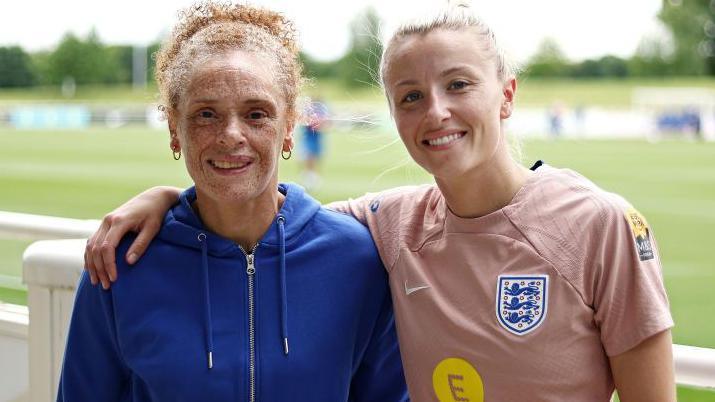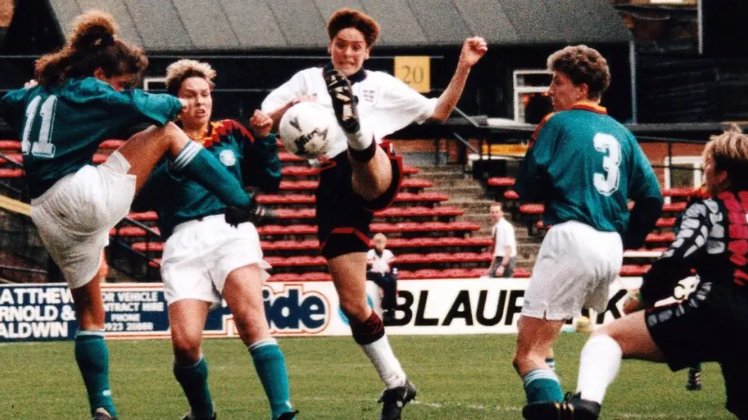'Am I a pioneer?' The Lionesses' first black player
Black History Month: Kerry Davis on being the first Black Lioness
- Published
"It's for other people to say whether I'm a pioneer or a trailblazer. It's not for me to say that."
Kerry Davis is a quietly spoken and a very humble 62-year-old but in the 1980s she made sporting history.
When she stepped out for England against Northern Ireland at Crewe's Gresty Road in 1982, Davis became the first black woman to play football for England, paving the way for the likes of Hope Powell, Alex Scott and Lauren James.
Davis would go on to represent England a further 81 times between 1982 and 1998, scoring a then-record 44 goals, only bettered by Kelly Smith (46) and Ellen White (52).
In recent months, recognition has finally come Davis' way.
In March, she received the Keith Alexander award from the Football Black List in recognition of her achievements as a pioneer and just two months later was given a lifetime achievement award at the 2024 Women's Football Awards.
Credit for the striker's achievements was long overdue but at the time the significance of her debut was lost on many, including Davis herself.
"To me, the most important thing was to play at the highest level I could and that was to play for England," Davis said.
"So, it was about representing and doing the best I could and being the best version of myself. It was my first game for England and that's where I wanted to be."

Kerry Davis (left) was invited by Sarina Wiegman to talk to the current Lionesses including captain Leah Williamson
'Pioneer' Davis recognised by Football Black List
- Published21 March 2024
Davis was speaking at St George's Park as the Lionesses were being put through their paces by manager Sarina Wiegman, a one-time opponent of hers at international level.
The professional surroundings of England's training base are far removed from Davis' experiences but it was something she always hoped would happen for those who followed her.
"I thought it could happen in my lifetime, that they'd have the same facilities as the men," Davis said.
"They've made all my dreams come true."
A peak audience of more than 17 million people on BBC TV watched the Lionesses beat Germany to win Euro 2022 at Wembley. It's a figure that was unimaginable when Davis first represented her country.
Two years after making her debut, Davis helped lead England to the final of the 1984 European Championship, an achievement that was largely overlooked.
It was a two-legged final against Sweden, which England lost on penalties in front of 2,500 fans at a very muddy Kenilworth Road. There was no television coverage and very little media attention.
"It does make me feel sad that our achievement was not recognised for a long, long time," Davis said.
"But you can't help when you were born.
"I know I've played for England. I know I've played at the highest level. I know I've played in a Euro final. The rest of it you can't change.”

Davis won 90 caps for England and scored 43 goals in a 16-year international career
Unlike when Davis started out, young girls in England can now grow up dreaming of representing their country. She began playing against boys her age and then at just 10 years of age she joined Sandbach Women in Cheshire.
Back then, football was an escape from the harsh reality of where she grew up in Staffordshire.
"Where we lived, there was a lot of racism," recalled Davis.
"It was around me a lot because I grew up in an area where there were probably only three or four Caribbean families.
"School was very painful - more so for my brother and sister than for me - because my outlet was just go and play football."
By her own admission, Davis only discovered that there was an England women's side when she joined Crewe Alexandra Ladies as a 16-year-old.
"They [Crewe] had a good coach there called John Fleet," Davis said.
"He was very forward thinking and he basically said that if I joined Crewe he'd help develop me, make me a better player.
"He was true to his word and then I got wind that there was an England team and that was my ambition," she added.
Things couldn't be more different now.
"The Lionesses have elevated the sport to a new level so it's become the norm that women play football. They're on television and they're making a career and earning money out of their passion," Davis said.
Her career also took her to Italy as a semi-professional which Davis says was light years ahead of women’s football in England at the time.
"It was like chalk and cheese basically,” Davis said.
"You didn't have to pay for your boots, you didn't have to pay for your kit, you didn't have to wash your kit. Those little details make a difference to your life and your football life.”
After her playing days were over, Davis wanted to stay in football but said the opportunities "weren't there".
Despite that, Davis' experiences haven't been lost to the game entirely.
She has, at Wiegman's request, spoken to the Lionesses about her generation and their battle for recognition.
She is also involved in a project in association with the National Football Museum with the likes of Powell and Nikita Parris to highlight the impact of players of Caribbean heritage on English football.
"I think it's really important to tell peoples' stories," Davis added.